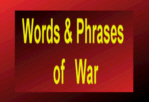|
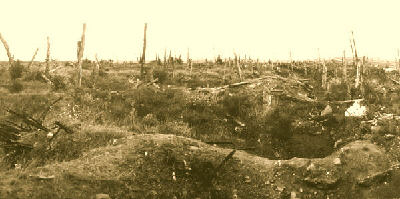
No Man's Land, Flanders
|
Term
|
Definition
|
Comments
|
Source
|
|
A-1
|
British, On top form.
|
By 1916 the British War Office had created an ABC system of
classification for the Department of Recruiting. Each category was then
graded in a scale of 1 to 3. A-1 men were fit for general service overseas. Reader Dr. David Street has brought to our attention a similar 18th century system from Lloyds of London for evaluating ships. This may be a case of the Great War spreading an existing usage much more widely.
|
EJ
|
|
Ace
|
An outstanding pilot, as well as an excellent performer in
any field.
|
At first the term meant simply a fine flier, a "high
card" to play against the enemy. Later the French singled out those
fliers who had downed at least five enemy planes.
|
CA
|
Ack-Ack
|
Anti-aircraft
fire
|
From
the military phonetic alphabet, A-A
|
PH
|
|
ANZACs
|
Acronym for Australian and New Zealand Army Corps.
|
Strong association with Gallipoli campaign. Read about the celebration of Anzac Day down under.
|
M
|
|
Archie
|
Anti aircraft gun or gunnery.
|
|
DSUE
|
|
Attrition, War of
|
A war in which each side seeks to wear the other out.
|
Expression dates from WW1.
|
EJ
|
|
Balloon goes up
|
The beginning of just about any enterprise.
|
Originally referring to an observation balloon sent aloft
to tell gunners to begin firing.
|
CA
|
|
Barrage
|
An excessive number or quantity.
|
After the massive artillery barrages of the war which always seemed excessive.
|
EJ; DSUE
|
|
Big Bertha
|
Huge Krupp 42cm siege guns used to attack the Belgian
forts at Liege in the opening of the war; generally applied to large German
artillery pieces.
|
Named for the daughter of Alfred Krupp, German arms
manufacturer.
|
IC
|
|
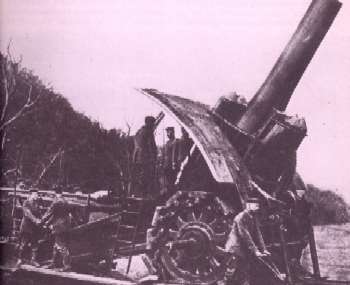
Big Bertha, Herself
|
|
Big Push, The
|
British reference to 1916 Battle of the Somme.
|
Later the battle also was know as the Great Cock-Up. Click here to read about this battle.
|
M
|
|
Big Show, The
|
Americanism for the Meuse-Argonne Offensive.
|
Largest American battle of the World War. Click here to read General Pershing's battle report.
|
M
|
|
Black Hand
|
A nationalistic organization in Serbia.
|
Believed responsible for the assassination of Archduke
Franz Ferdinand.
|
RHD
|
|
Blighty
|
Home; originally British for England; later a Blighty was a wound which would
get one sent home.
|
Derived from a Hindu word meaning a foreign country and
taken up by British troops in India to refer to Britain.
|
EJ
|
|
Blimp
|
A nonrigid airship used for observation.
|
|
RHD
|
|
Blotto
|
Prewar slang for drunkenness; during the war it referred to strong liquor.
|
|
DSUE
|
|
Blue Max
|
Nickname for German medal awarded to Rommel, Richthophen,
Boelcke among others.
|
Some dispute whether the expression Blue Max was
actually used during the war.
|
M
|
|
Boche
|
Disparaging epithet for anything German.
|
Used primarily by officers; derived from French caboche = blockhead.
|
EJ; RHD
|
|
Boelcke’s Dicta
|
Rules for successful fighter pilots developed by German
ace & aviation pioneer Oswald Boelcke. Click here to read about the Dicta.
|
Boelcke died in a collision with a colleague while flying
his sixth mission of the day, 15 October 1916.
|
M
|
|
Bonk
|
To shell with artillery fire.
|
Usually used in passive sense of being bonked.
|
DSUE
|
|
Brass Hats
|
High ranking officers.
|
British staff officers had a red band around their hats.
|
RHD
|
|
Break new ground
|
To do something not done before.
|
Probably an allusion to digging a new trench.
|
?
|
|
Buck private
|
Americanism for a private without any stripes.
|
|
DSUE
|
|
Bull
|
Shortened version of Bullshit.
|
Slang for unnecessary work, especially cleaning. The notorious British training camp at
Etaples was known as the Bullring.
|
M
|
|
Bullshit
|
Nonsense; empty talk; later to deceive a person or pull
his leg.
|
Complicated prewar origins from English language countries
with Australia given most credit.
|
DSUE
|
|
Bully [Beef]
|
Canned boiled or pickled beef which was a staple with the
British Army.
|
|
RHD
|
|
Bunker
|
Fortification set mostly below ground level with overhead
protection.
|
Probably from coal bunker.
|
RHD
|
|
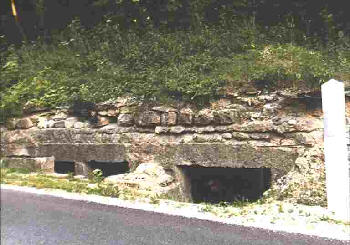
Machine Gun Bunker
St. Mihiel Salient
|
|
Camouflage
|
Disguise, pretense; although the expression is still also used in its original sense, describing the special coloring schemes applied to equipment and uniforms to make the object harder to see.
|
French derivation from comoufler = disguise. Some of the original schemes are thought to have been inspired by the cubists and other modernist painters.
|
EJ; DSUE
|
|
Chat
|
Nickname for body louse.
|
|
M
|
|
Chatting
|
Conversing in an informal manner.
|
Lice were sometimes called ‘chats’; Soldiers who spent many an hour removing
them from the seams of their clothing passed the time in discussions with
their mates. This led to the popularizing of chatting which had been in use since the 16th century.
|
EJ; RHD
|
|
Chit
|
British slang for a piece of paper.
|
From the Indian Army.
|
W
|
|
Chew the fat
|
To sulk, to be resentful or talk in such a manner; presently means have a discussion.
|
Has lost the negative connotation since the war.
|
DSUE
|
|
Chew the rag
|
To argue endlessly; presently means have a discussion.
|
Has lost the negative connotation since the war.
|
DSUE
|
|
Chow
|
Food; rations; a chow hall is a military dining hall.
|
Started in the maritime world by 19th Century ship crews who visited the orient. During the Great War it was passed on to the other services.
|
AMW
|
|
Coal Scuttle
|
Nickname for German field helmet used in late WWI and WWII.
|
So named because the helmets resembled the metal bucket
used to carry coal.
|
RHD
|
|
Cold feet
|
To become discourage; possibly linked to trench foot or trench fever.
|
Some controversy as to how common this usage was during the war.
|
DSUE
|
|
Conchie
|
A conscientious objector .
|
|
M
|
|
Conk Out
|
Slang for stopping, failing, passing out or dying.
|
Originated in the American Air Service, conk being the
last sound a reciprocating engine makes before it ceases operating.
|
RHD
|
|
Cootie
|
Slang, body louse. See an image and read an ode to
a Cootie.
|
Brought by British Army from Malaya.
|
RHD
|
|
Crummy
|
Synonymous with lousy.
|
A reference to the eggs of the lice being like crumbs of
bread.
|
EJ
|
|
Cushy
|
Slang for nice, or comfortable, from Urdu kushi
‘pleasure’.
|
Another Anglo-Indian Army word popularized in WW1.
|
EJ
|
|
D-Day
|
Initial day of a military operation.
|
First used by American First Army at St. Mihiel, September
12, 1918.
|
M
|
|
Der Tag
|
German for The Day.
|
From German nationalist movement; in the Great War it came
to refer to the Day conquest would begin.
|
RHD
|
|
Devil Dogs
|
Nickname given to the US Marines by Germans who faced them
at Belleau Wood.
|
The Germans in this sector had previously come to admire
the huge Mastiffs guarding a chateau in the nearby village of Belleau.
|
M
|
|
Dig oneself in
|
Establish one’s position strongly.
|
From entrenching.
|
DSUE
|
|
Diggers
|
Self-name for Australian troops in World War I.
|
Traceable back to 19th Century Australian gold
fields. Resurrected by members of 1915
Gallipoli expedition who had to dig into cliffs to survive.
|
DSUE
|
|
Digging-In
|
To establish one’s position, as if digging a defensive
trench.
|
|
EJ
|
|
Dogfight
|
Air combat at close quarters.
|
Based on the scrambling, twisting appearance of air
warfare from the ground.
|
M
|
|
Doughboys
|
US soldiers of the First World War; long a disparaging
name for American infantrymen, its usage broadened and became strictly
positive in the war.
|
See
an article on the derivation of Doughboy.
|
M
|
|
Draftee
|
Conscript soldier.
|
The aggregate of a call-up cycle became known as a draft, so draftee was the natural term for an individual who had been selected. This in contrast to volunteers or regular [career] soldiers.
|
DSUE
|
|
Duckboard
|
A board laid down as a track or floor over wet or muddy
ground.
|
Used for both trench floors and trails across flooded
fields.
|
RHD
|
|
Dud
|
A shell or bomb that fails to explode; later, a person or
enterprise that proves to be a failure.
|
|
EJ, RHD
|
|
Dugout
|
A rough dwelling in a bank or side of a hill.
|
Construction of noun from verb phrase dug out.
|
RHD
|
|
Dump
|
Temporary
Depot where supplies are left for distribution.
|
From
US 19th Century: Pile of refuse
|
RDH
|
|
Eleventh Hour
|
Just in time, at the last moment.
|
The armistice of WW1 came into effect at the 11th hour of
the 11th day of the 11th month.
|
EJ
|
Ersatz
|
Substitute,
artificial, sub-standard
|
1919
German for substitute foods and materials
|
PH
|
Fed-Up
|
Disgusted
|
First
used in Boer War and carried over by British Army
|
DSU
|
|
Fleabag
|
Old rundown hotel or accommodations.
|
From Army slang for sleeping bag or bedroll.
|
M
|
|
Fred Karno’s Army
|
Nickname given to the British Army raised after the start
of WW1, in allusion to Fred Karno, a comedian and producer of burlesque.
|
Also known as Kitchener’s Army.
|
EJ
|
|
Frightfulness
|
German policy of intimidating populations in occupied
territories.
|
Translation of German policy of Schrecklichkeit.
|
DSUE
|
|
Fritz
|
Sympathetic nickname for German soldiers by Allies.
|
From ‘Old Fritz’ a name for Frederick the Great of Prussia
(1712- 1786).
|
EJ
|
|
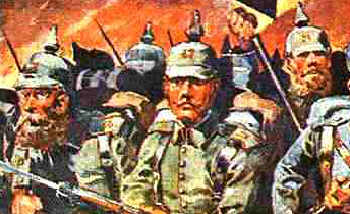
Fritz Wearing His Pikelhaube.
|
|
Frog
|
Derogatory term for a Frenchman with 18th Century origins.
|
From frog eater.
|
DSUE
|
|
Frontschwein
|
Literally, frontline pigs. Implied is the imminence of being slaughtered.
|
How German soldiers referred to themselves.
|
M
|
|
Funk
|
Dejected mood; to shrink from.
|
Funk holes were excavated openings on the front walls of
trenches where soldiers could retire when not on duty.
|
RHD
|
|
Gassed
|
Slang for tipsy or drunk.
|
From the disorienting effects of a gas attack.
|
DSUE
|
|
Give her the gun
|
Slang expression still used to expedite accelerating an
engine.
|
From WWI air operations.
|
CA
|
|
GI Can
|
GI was the abbreviation for galvanized iron during the war and a GI can was a large trash receptacle. This was then applied as a nickname to large German artillery shells.
|
During WWII GI was the abbreviation for government issue and it was applied to everything from GI soap to GI shoes and, eventually, the troops themselves.
|
AMW
|
|
Go phut
|
To stop functioning or to come to grief.
|
Hindustani term used by Kipling in 19th Century.
|
DSUE
|
|
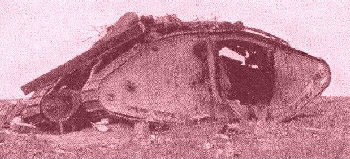
A Tank, Gone Phut
|
|
Gone West
|
Slang, To die; fail; decline.
|
Go west towards the setting sun.
|
DSUE
|
|
Great War, The
|
The First World War
|
Formerly used for the Napoleonic Wars, it was first applied to the events of 1914-1918 in the October 1914 Macleans Magazine
|
OED
|
|
Hedge-hop
|
Flying near the ground.
|
Air service origins.
|
CA
|
|
Huns
|
Derogatory term for German Soldiers.
|
Kaiser Wilhelm originally associated Germany with the
ancient nomadic tribe that plundered much of Europe.
|
M
|
|
Hush-Hush
|
Used in WW1 to describe top-secret operations.
|
|
EJ
|
|
Jack Johnson
|
Large artillery shell.
|
The power and large amount of dark smoke given off by big
shell explosions were reminiscent of black Heavyweight boxing champion Jack
Johnson.
|
M
|
|
Jerry
|
Sympathetic nickname for German soldiers by Allies.
|
Derived from a: German[y] according to one theory,
or b: the fact that the British thought the German helmets looked like
chamber pots, also known as jeroboams, abbreviated to Jerries.
|
CA, M
|
|
Joystick
|
Control
handle or lever for machinery
|
From
the airplane's hand-operated control device.
|
CA
|
|
Kaput
|
Slang for ruined, broken not working.
|
From 20th century German kaputt 'done for'.
|
EJ
|
|
Kitchener’s Armies
|
Refers to British enlistees who responded to Lord
Kitchener’s 1914 appeal for volunteers.
|
This group provided the manpower for the disastrous 1916
Battle of the Somme.
|
M
|
|
Kraut
|
Derogatory term for anything Germanic.
|
Short version of German food Sauerkraut.
|
M
|
|
Last Post
|
British equivalent of US Taps.
|
Read about the Last Post Ceremony every evening at the
Menin Gate in Ypres.
|
|
|
Lousy
|
Infested with lice; mean, contemptible, contaminated,
unethical, etc.
|
|
RHD
|
|
Maconochie
|
Canned British ration of beef, potatoes, beans, onions and
carrots in gravy.
|
|
M
|
|
Mine
|
Subterranean passage made to extend under an enemy’s works
or position for the purpose of securing access or depositing explosives for
blowing up a military position.
|
Used in earlier warfare such as at Petersburg, Virginia in
the American Civil War, mines were frequently used on both the Western and
Italian Fronts of the Great War.
|
M
|
|
Mockup
|
A near full-sized, non-working model of a new design.
|
Derived from practices in World War I's bustling aircraft industries.
|
M
|
|
Monkey Meat
|
Nickname for French canned beef from Madagascar.
|
Loathed by US troops.
|
?
|
|
Muck about
|
To wander aimlessly.
|
Used by Kipling and adopted by the BEF.
|
DSUE
|
Napoo
|
Done, used up;
later to kill.
|
The origin is in the French phrase "il n'y en a plus" meaning "There is (are) no more....."
|
DSUE with help from Contributor Shaun Pike.
|
|
Nest, Machine Gun
|
Strong point of multiple machine guns with overlapping
fields of fire.
|
Adaptation of nest=collection.
|
OED
|
|
No-Man’s-Land
|
The desolate territory between the hundreds of miles of
opposing Allied and German trenches.
|
Dates from the 1300s, when it meant the waste ground
between two kingdoms, it did not acquire its military meaning until World War
I.
|
CA
|
|
Nose dive
|
Sharp descent or decline, as in, "The stock market
took a nose dive today."
|
Originally a description of fighter pilots’ tactic of pouncing down on the enemy from above.
|
CA
|
|
Old bean
|
Form of addresse which started in the Royal Navy about
1914 and spread to other services.
|
Old… became a popular form of approval during the war, as
with beloved cartoon character Old Bill.
|
DSUE
|
|
Old Contemptibles
|
Nickname for British Army regulars who formed the original
BEF. Few survived the war.
|
From the Kaiser’s reference to “General French’s
contemptible little army…”
|
M
|
|
Outfit
|
A soldier's unit; usually an infantry regiment or artillery battery.
|
Has Canadian and Australian roots in the 19th century when the term was applied to a travelling party.
|
DSUE
|
|
Over the top
|
Going out of one’s trench towards the enemy; in civilian
use it was extended to mean taking the final plunge and doing something
dangerous or notable.
|
Popularized by
Arthur Guy Empey's use of Over the Top as the title for his popular World War
I account.
|
CA
|
|
Pals battalions
|
For the Kitchener armies, men from the same town or trade
were allowed to enlist and serve together.
|
Potentially catastrophic for a community if a Pals unit took heavy
casualties.
|
M
|
|
Paris Gun
|
Krupp artillery piece designed to fire over 75 miles to
bombard Paris. Sometimes confused with Big Bertha.
|
The first time the shells landed, air raid sirens sounded
in Paris because they did not realize a gun could fire that far. Strictly a
terror weapon.
|
M
|
|
Pikelhaube
|
German spiked helmet used in first half of the war.
|
|
M
|
|
Pillbox
|
Low structure for of reinforced concrete usually enclosing
a machine gun.
|
|
RHD
|
|
Pip, Squeak and Wilfred
|
British nicknames for the 3 standard service medals issued
to veterans.
|
Named after popular cartoon characters of the era.
|
DSUE
|
Pipsqueak
|
Small,
insignificant person; any 2nd Lieutenant; also a small German trench gun.
|
Coined just before WWI
|
PH
|
|
Plug Street
|
The Tommy’s nickname for the Belgian village of
Ploegsteert.
|
|
EJ
|
|
Poilu
|
Front line French soldier, literally, hairy-one.
|
The noun poil is used primarily for the hair of
animals. Dauzat points out that the term implies more than just an unshaven
man, hair is also a traditional symbol of virility.
|
EJ
|
|
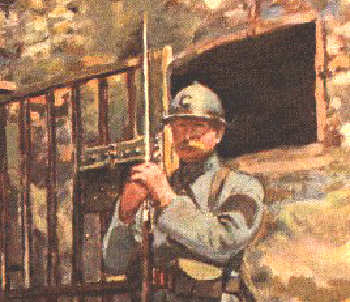
French Poilu on Guard Duty
|
|
Pop
|
The Tommy’s nickname for Poperinghe, a town 8 miles due
west of Ypres.
|
It was the final rail head en route to the front and home
of Toc H.
|
EJ
|
|
Posh
|
British slang for looking sharp.
|
From the British
travelling to and from India by ship in the colonial days. Because of
the heat from the sun, the rich passengers secured cabins on the Portside
going east and Starboard side coming back to Britain which assured them
the coolest part of the ship Therfore it was Port-Out Starbord-Home and
finally shortened to POSH to describe goods and services much better than
the norm.
|
W; with details from Contributor John Turk [Real Name].
|
|
Potato Masher
|
Nickname for standard German hand grenade; also a nickname
for club used in trench raids.
|
Based on resemblance to the kitchen tool.
|
DSUE
|
|
Push Up the
Daisies
|
To
be killed and buried
|
|
RDH
|
|
Put a sock in it
|
Imperative telling some one to shut up.
|
|
DSUE
|
|
Q-Ship
|
Antisubmarine armed vessel disguised as common steamer.
|
|
M
|
|
Red cap
|
British military policeman.
|
|
DSUE
|
|
Red Tabs
|
Slang, British staff officers.
|
Derived from lapel tabs on uniform blouse of General Staff
officers.
|
M
|
|
Regimental
|
British. Slang; a mess, a signal failure.
|
Short for Regimental Foul-Up.
|
DSUE
|
|
Shell Shock
|
To suffer from an acute neurasthenic condition due to the
explosion of shells or bombs at close quarters.
|
Early description of Battle Fatigue and Post Traumatic Stress Syndrome.
|
EJ
|
|
Shit hot
|
Unpleasantly enthusiastic.
|
Credited to the Canadian forces.
|
DSUE
|
|
Shoot down in flames.
|
To refute the argument of an opponent completely.
|
A metaphor from aerial warfare.
|
EJ
|
|
Slum
|
Slang, a thin stew eaten by the American soldiers.
|
Abbreviation of slumgullion.
|
M
|
|
Spanish Flu
|
Pandemic respiratory infection that spread through out the
world during the later days of WWI, killing 20-30 million worldwide.
|
Originally brought to Europe by the doughboys as a form of
swine flu, the virus mutated and became a worldwide killer. Read a recent article about the pandemic by clicking here.
|
M
|
|
Stormtrooper
|
Specially trained German assault troops used in their 1918
Offensives.
|
Nickname later adapted by Nazi Brown Shirts.
|
DSUE
|
|
Strafing
|
Machine-gunning enemy troops and planes on the ground.
|
Derived from the German verb strafen, meaning
"to punish.".
|
CA
|
|
Tailspin, In a
|
Out
of control; about to crash
|
From
aircraft spinning towards the ground
|
RHD
|
|
Take his name and number.
|
Place on report.
|
|
DSUE
|
|
Tanks
|
Armored, self-propelled vehicle first used in the Battle
of the Somme, 1916.
|
As a deception the original shipping crates of these
vehicles were labeled Tanks and the name stuck.
|
M
|
|
Taxi
|
To move an airplane along the ground under its own power.
|
Presumably came from likening the plane's movement to that
of a taxicab.
|
CA
|
|
Tin Hat
|
Slang for British and American model helmet. Battle Bowler was also used by the British forces.
|
Click here to learn about the Tin Hats worn by doughboys.
|
RHD
|
|
Toc H
|
Talbot House at Poperinghe.
|
A refuge for all soldiers regardless of rank, run by two
army chaplains Neville Talbot and Philip 'Tubby' Clayton.
|
EJ
|
|
Tommy, Tommy Atkins
|
British frontline soldier.
|
Goes back to Wellington’s time when the British soldiers’
specimen pay book was made out for Thomas Atkins; usage popularized by Kipling.
|
M
|
|
Toot sweet
|
Americanism for doing things at high speed.
|
From the French tout de suite.
|
AMW
|
|
Trench
|
The long narrow excavations used to shelter troops from
enemy fire which were pervasive on all World War I battlefields.
|
The use of trenches to conceal military forces long
predates 1914, and indeed they were called "trenches" from about
1500 on.
|
CA
|
|
Trench Coat
|
Short waterproof overcoat, belted, double-breasted with
straps on shoulders and arms. Originally
worn by officers in the First World War, they are still in fashion.
|
Trenches were frequently, if not always, wet and
muddy. Officers were able to purchase
this specially tailored coat. The
ranks just got wet.
|
CA
|
|
Trench Fever
|
A louse borne relapsing febrile disease which struck
soldiers of the Great War; characterized by fever, weakness, dizziness,
headache, severe back and leg pains and a rash.
|
Also called Wolhynian Fever, it is treated with
antibiotics today. Read an article about how Trench Fever is making a
comeback today in homeless populations.
|
CA
|
|
Trench Foot
|
Common disabling problem among WWI soldiers.
|
Also called Immersion Syndrome, it is caused by
overexposure to cold, damp conditions; and is treated, like chilblains, by
rapid warming.
|
CA
|
|
Trench Mouth
|
Formerly called Vincent's Infection, characterized by
painful, bleeding gums and bad breath, this was another common affliction
among frontline soldiers.
|
It was caused by poor oral hygiene and nutrition, heavy
smoking, and stress--all conditions endemic in the trenches.
|
CA
|
|
Trench Rabbit
|
Slang, rat.
|
American contribution.
|
DAS
|
|
Trip wire
|
Anything which might catch someone or trigger a response.
|
Troops who advanced close to the enemy line often had to
cut wires some of which were strung to set off a trap or an alarm.
|
CA
|
|
U-Boat
|
German submarine.
|
From German Unterseeboot, lit. undersea boat.
|
RHD
|
|
Up against the wall
|
In serious difficulties.
|
Those facing a firing squad are placed against a wall.
|
DSUE
|
|
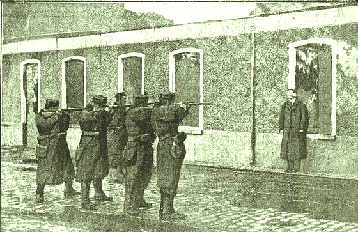
Accused Spy Up Against the Wall
|
|
Wastage
|
Used as euphemism for killed and wounded by politicians and generals; sometimes used to differentiate casualties in the presumably less productive interim periods from the major battles.
|
|
OED
|
|
Whiz-bangs
|
A high speed shell whose sound as it flies through the air
arrives almost at the same instant as its explosion; later synonymous with
excellent or topnotch.
|
The purest form of this sound was made by an
Austrian Skoda 77mm field piece.
|
M
|
|
Willie
|
Canned corn beef.
|
Both loved and hated by the doughboys. Read a poem that captures this attitude.
|
M
|
|
Wipers
|
The Tommy’s nickname for Ypres and the Salient.
|
|
M
|
|
Zeppelins
|
Large rigid airships used for observation and strategic
bombing by both German Army and Navy.
|
Generically applied to all German airships a number of
which were not manufacture by Count Zeppelin’s company, and even to Allied
airships.
|
IC
|
|
Zero-Hour
|
Starting time for a military operation; later – critical
or decisive time.
|
|
RHD
|

